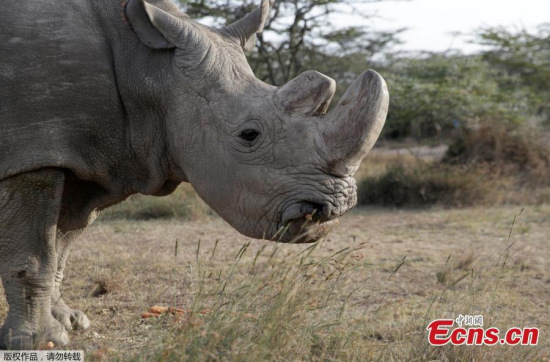
File photo: The last surviving male northern white rhino named "Sudan" is seen at the Ol Pejeta Conservancy in Laikipia, Kenya June 18, 2017. (Photo/Agencies)
People all over China are grieving after the world's last male northern white rhinoceros departed from the planet Monday, and called for better protection for Africa's megafauna.
END RHINO HORN TRADE
"The death of Sudan is a wake-up call for us all to contemplate the long term effect of our actions," commented Ma Weidu, Chinese antique connoisseur and rhino protection advocate, in an interview with Xinhua.
Sudan, the last male of the species, aged 45, was euthanized at Ol Pejeta Conservancy in Kenya, after unsuccessful attempts to alleviate age-related health problems, his keepers announced Tuesday.
His death leaves only two female survivors of the subspecies -- his 27-year-old daughter Najin and 17-year-old granddaughter Fatu, who remain at Ol Pejeta.
"The only hope for the subspecies now lies with in vitro fertilization," said an Ol Pejeta press release.
"Sudan spent his final years teaching us the consequences of killing driven by greed", said Ma. "The tragedy of the rhinoceros is one of those consequences, and for humanity, the tragedy has only begun."
On World Rhino Day last year, Ma endorsed WildAid's rhino conservation campaign, saying "Collectibles rooted in killing are valueless."
"Ivory and rhino horn products dating from any historical period should be banned from public trade and auctions," suggested Ma. He has asked major international auction houses to put an end to all forms of rhino horn sales, including antiques.
REMEMBERING SUDAN
"When I embraced Sudan, I knew I would remember his tenderness for as long as I shall live," recalled Jiang Yiyan, Chinese actor and WildAid ambassador who met the rhino at Ol Pejeta in 2016.
"Neither will I ever forget the gunshots of the poachers who made Sudan the last, lonely male northern white rhino," she said.
Despite his advanced age and dimmed sight, Jiang described Sudan as amiable, genial and defenseless.
"We should immediately stop harming such amazing animals," she said.
Former NBA All-Star Yao Ming and actor Jackie Chan are among the public figures who work to save endangered species by calling on to the Chinese public to stop buying wildlife products.
"I was deeply saddened by the news," Yao Ming posted Wednesday, with an archive image of Sudan. Yao visited Ol Pejeta as a WildAid ambassador in 2012.
"If you purchase rhino horn, you are spending money on guns, bullets, poison darts, chainsaws, axes and machetes to cut off the rhino's face. You become the murderer of such a beautiful animal," Jackie Chan told the public in a WildAid awareness video.
BATTLING SMUGGLING
During the this year's legislative session, the country's leadership called for more energy and more concrete measures to protect flora and fauna as part of China's development strategy.
Last June, a man was sentenced to four years in prison and fined of 40,000 yuan (about 6,300 U.S. dollars) for attempting to smuggle 8.8 kilograms of ivory through Beijing airport. The Chinese criminal code stipulates prison terms of up to life and substantial fines for those who break wildlife protection laws.
"With more stringent legislation and law enforcement, black market prices for rhinoceros horn are about one-third of what they once were," said Peter Knights, founder and CEO of WildAid on World Rhino Day last year.
All sales in rhino horn have been illegal in China since 1993, and rhino horn has been removed from the traditional Chinese medicine handbook. Since 2011, all rhino horn items have been banned from auctions.
INNOVATION AND TECHNOLOGY
Earlier this month, twenty-one tech firms including China's Alibaba, Baidu and Tencent, announced the foundation of a global coalition to end wildlife trafficking online. The coalition brings together companies and the World Wildlife Fund (WWF), TRAFFIC and the International Fund for Animal Welfare (IFAW) with the aim of reducing online wildlife trafficking by 80 percent by 2020. Other founding members of the Coalition include Facebook, Google, Microsoft and Ebay.
In China, a similar project, has been monitoring illegal online sales of wildlife products since 2015
A collaboration between TRAFFIC and Tencent tracks illegal trade on Tencent's platforms, including instant messaging app WeChat, with its more than 1 billion active accounts. WeChat users can easily report their suspicions via the account "Penguin loves Planet Earth."
The project will ensure real progress in tackling online wildlife trafficking through social media," said Steven Broad, executive director of TRAFFIC, the wildlife trade monitoring network.


















































